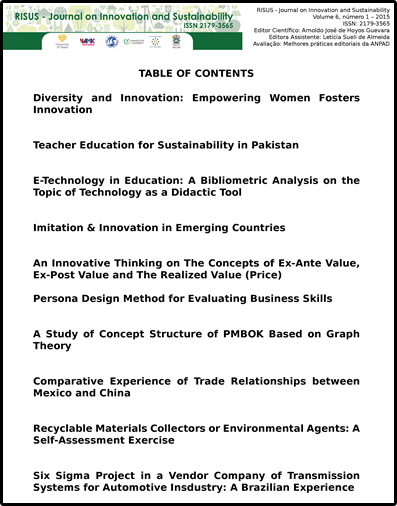E-Technology in Education: A Bibliometric Analysis on the Topic of Technology as a Didactic Tool
DOI:
https://doi.org/10.24212/2179-3565.2015v6i1p20-36Palabras clave:
education, technology, didactic tool, bibliometric analysisResumen
The use of electronic technologies (e-technologies) in educational process gains asignificant approach on the academic debate from the 1990’s on. The discussion of such topicintensifies specially with Internet phenomenon, besides the rising of a globalized access to electronictechnologies and the need of both educators and researchers to understand the relationship ofsuch technologies in the process of learning. This article aims to analyze the current status of studiesabout technologies as a didactic tool, by the use of bibliometric analysis, in ordter to get an overviewof the studies published in the period 1995 to 2015, as well as to verify how other topics has beenassociated and how relevant they can be considered to global studies concerning the relationshipbetween technology and education. The analysis involves both qualitative and quantitative data. Itis important to state that in terms of qualitative approach the aspects surrounding technology anddidactic tools were carried out using the procedures of content analysis, key words and relevanttopics. As far as quantitative approach, the following variables were adopted: authors, source,total number of publications, publication year, main institutions, languages and countries. All theinformation was obtained by consulting the electronic database ISI Web of Science, selecting themain journals, as well as their impact factor index, by searching at Journal of Citation Report (JCR).The methodology used in this article implies the data obtained from ISI Web of Science, showingthe most cited journals and most prolific authors, as a way to analyze the trends of research andavenues for future studies.Descargas
Publicado
2015-03-30
Número
Sección
Papers
Licencia
This Journal is licensed under a Creative Commons Attribution-Non Commercial-No Derivers 4.0 International license.
1.The author (s) authorize the publication of the article in the journal;
2.The author (s) warrant that the contribution is original and unpublished and is not in the process of being evaluated in other journal (s);
3. The journal is not responsible for the opinions, ideas and concepts emitted in the texts, as they are the sole responsibility of its author (s);
4. The editors are entitled to make textual adjustments and to adapt the articles to the standards of publication.


